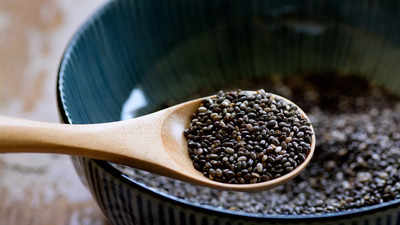Trending
7 things you should not add to chia seeds and why
The rise in popularity of chia seeds and flaxseeds has led to various dietary uses, but certain combinations should be avoided. Excess sugar, artificial sweeteners, unhealthy oils, excessive salt, spicy foods, dry ingredients, and high-sugar juices can diminish the health benefits of chia seeds or cause digestive issues. Proper hydration and moderation are key to maximizing their benefits.

With the change in eating habits and major focus on the concepts like calorie-deficit diet plans, the consumption of food items like chia seeds and flaxseeds has seen a swift spike. While they surely make for a healthy choice and help to create a balanced diet many of us don't know how much is too much and what are the food items they should not be clubbed with to avoid major side effects. Recently, we shared an article on hidden side effects of chia seeds and in continuation to that, this piece of information will talk about 7 things one should not add to chia seeds and why. Scroll down to read the details.
Recently, we shared an article on hidden side effects of chia seeds and in continuation to that, this piece of information will talk about 7 things one should not add to chia seeds and why. Scroll down to read the details.
Excessive sugar: From chia seed pudding to chia-based desserts, there are many dishes in which chia seeds are mixed with sugar and that should be avoided.
Why: As per experts, while a touch of sweetness can enhance flavor, adding too much sugar—whether in the form of syrups, honey, or granulated sugar—can lead to unnecessary calorie intake and blood sugar spikes. This hinders the health benefits of chia seeds, which are prized for their ability to help regulate blood sugar levels.
Artificial sweeteners: Dishes like ice cream and smoothie bowls often add artificial sweeteners to attract young customers and that can be harmful too.

Also Read:Hidden side effects of drinking chia seed water
High-fat or unhealthy oils: These days salads with oil dressing also have a topping of chia seeds and that combination is certainly not good. Read below why.
Why:
Excessive salt: From salads to savoury pudding, salt is there everywhere and adding it with chia seeds can only lead to health issues.
Why: While it is said that a small amount of salt can enhance flavor, but, adding too much can lead to excessive sodium intake, which is linked to high blood pressure and other cardiovascular issues. Chia seeds themselves have a mild, nutty flavor that doesn't require excessive seasoning, hence one should avoid combining them together.
Spicy food: Adding chilli, pepper and peppercorn along with chia seeds is also not a healthy habit.
Why: As per food experts, adding ingredients like cayenne pepper or hot sauce to chia seeds can cause digestive discomfort, due to its high fiber content. Also, spicy additions might also overpower the subtle flavor of chia seeds, making the dish less delectable.

Dry ingredients: Soaking chia seeds is important and consuming it directly along with nuts and other seeds can have adverse effects on the digestive system.
Why: Chia seeds absorb liquid and expand to form a gel-like consistency. Consuming them dry or with insufficient liquid can pose a choking hazard, as they can swell in the throat. Hence, it is always important to soak them in water or milk.
Packaged juices: Soaking the seeds is important, but adding them to packaged juices is definitely not a good idea.
Why: While adding fruit can be beneficial, using high-sugar fruit juices as the liquid base can increase the overall sugar content and increase overall sugar intake.
What is the right way to eat chia seeds?
The right way to consume chia seeds is to soak them in water, juice, or milk for at least 30 minutes before eating. This process allows the seeds to absorb liquid, expanding in size, which enhances digestibility and nutrient absorption. You can also add soaked chia seeds to smoothies, yoghurt, or oatmeal for a nutritious boost of fiber, omega-3 fatty acids, and antioxidants.
Hydration: It is important to always mix chia seeds with plenty of liquid to allow them to absorb and expand, to make them safe for consumption
Moderation: As per experts, serving size of 1-2 tablespoons a day is good to avoid any digestive issues.
Right pairing: It is important to combine chia seeds with fresh fruits, nuts, and other seeds, and to maximize their health benefits. It also goes well with milk or curd and helps gain maximum benefits.
Side effects of eating too much Chia Seeds
Chia seeds contain omega-3 fatty acids, which can thin the blood and may increase the risk of bleeding, especially for those taking blood-thinning medications. Some people may experience allergic reactions to chia seeds, such as skin rashes, itching, or difficulty breathing. Chia seeds may interact with medications, particularly those for high blood pressure or blood sugar. If you're on medication, it's best to consult with a healthcare provider. Due to their high fiber content, consuming too many chia seeds can cause bloating, gas, constipation, or diarrhea, especially if they are not soaked properly or if you are not accustomed to a high-fiber diet. Although rare, some people may experience allergic reactions to chia seeds, including skin rashes, itching, or difficulty breathing. Although rare, some people may experience allergic reactions to chia seeds, leading to symptoms like skin rashes, itching, or respiratory issues. Due to their effects on blood sugar and blood pressure, chia seeds can potentially interact with medications for diabetes, blood pressure, or anticoagulants.
Benefits of Chia Seeds
Chia seeds are one of the richest plant-based sources of omega-3 fatty acids, particularly alpha-linolenic acid (ALA), which is essential for heart and brain health. A single ounce (about 28 grams) of chia seeds contains around 11 grams of fiber, which can support digestive health and help regulate blood sugar levels. Also, did you know chia seeds were a staple in the diets of the ancient Aztecs and Mayans, valued for their energy-boosting properties. And, chia seeds can absorb up to 12 times their weight in water, forming a gel-like texture, which makes them a great addition to puddings and smoothies.
Thumb and Embed Images Courtesy: istock

Excessive sugar: From chia seed pudding to chia-based desserts, there are many dishes in which chia seeds are mixed with sugar and that should be avoided.
Why: As per experts, while a touch of sweetness can enhance flavor, adding too much sugar—whether in the form of syrups, honey, or granulated sugar—can lead to unnecessary calorie intake and blood sugar spikes. This hinders the health benefits of chia seeds, which are prized for their ability to help regulate blood sugar levels.
Artificial sweeteners: Dishes like ice cream and smoothie bowls often add artificial sweeteners to attract young customers and that can be harmful too.
Why: Artificial sweeteners like aspartame or sucralose may cause digestive discomfort and it is said that they can interfere with the natural sweetness and nutritional profile of chia seeds, potentially leading to cravings for more sweet foods.

Also Read:Hidden side effects of drinking chia seed water
High-fat or unhealthy oils: These days salads with oil dressing also have a topping of chia seeds and that combination is certainly not good. Read below why.
Why:
As per health experts, adding large amounts of unhealthy fats, such as those from processed vegetable oils or excessive butter, can increase the calorie count and introduce unhealthy trans fats. While healthy fats like those found in nuts, seeds, or avocado are beneficial in moderation, it's important to avoid unhealthy fats that can counteract chia seeds' positive effects on heart health.
Excessive salt: From salads to savoury pudding, salt is there everywhere and adding it with chia seeds can only lead to health issues.
Why: While it is said that a small amount of salt can enhance flavor, but, adding too much can lead to excessive sodium intake, which is linked to high blood pressure and other cardiovascular issues. Chia seeds themselves have a mild, nutty flavor that doesn't require excessive seasoning, hence one should avoid combining them together.
Spicy food: Adding chilli, pepper and peppercorn along with chia seeds is also not a healthy habit.
Why: As per food experts, adding ingredients like cayenne pepper or hot sauce to chia seeds can cause digestive discomfort, due to its high fiber content. Also, spicy additions might also overpower the subtle flavor of chia seeds, making the dish less delectable.

Dry ingredients: Soaking chia seeds is important and consuming it directly along with nuts and other seeds can have adverse effects on the digestive system.
Why: Chia seeds absorb liquid and expand to form a gel-like consistency. Consuming them dry or with insufficient liquid can pose a choking hazard, as they can swell in the throat. Hence, it is always important to soak them in water or milk.
Packaged juices: Soaking the seeds is important, but adding them to packaged juices is definitely not a good idea.
Why: While adding fruit can be beneficial, using high-sugar fruit juices as the liquid base can increase the overall sugar content and increase overall sugar intake.
What is the right way to eat chia seeds?
The right way to consume chia seeds is to soak them in water, juice, or milk for at least 30 minutes before eating. This process allows the seeds to absorb liquid, expanding in size, which enhances digestibility and nutrient absorption. You can also add soaked chia seeds to smoothies, yoghurt, or oatmeal for a nutritious boost of fiber, omega-3 fatty acids, and antioxidants.
Hydration: It is important to always mix chia seeds with plenty of liquid to allow them to absorb and expand, to make them safe for consumption
Moderation: As per experts, serving size of 1-2 tablespoons a day is good to avoid any digestive issues.
Right pairing: It is important to combine chia seeds with fresh fruits, nuts, and other seeds, and to maximize their health benefits. It also goes well with milk or curd and helps gain maximum benefits.
Side effects of eating too much Chia Seeds
Chia seeds contain omega-3 fatty acids, which can thin the blood and may increase the risk of bleeding, especially for those taking blood-thinning medications. Some people may experience allergic reactions to chia seeds, such as skin rashes, itching, or difficulty breathing. Chia seeds may interact with medications, particularly those for high blood pressure or blood sugar. If you're on medication, it's best to consult with a healthcare provider. Due to their high fiber content, consuming too many chia seeds can cause bloating, gas, constipation, or diarrhea, especially if they are not soaked properly or if you are not accustomed to a high-fiber diet. Although rare, some people may experience allergic reactions to chia seeds, including skin rashes, itching, or difficulty breathing. Although rare, some people may experience allergic reactions to chia seeds, leading to symptoms like skin rashes, itching, or respiratory issues. Due to their effects on blood sugar and blood pressure, chia seeds can potentially interact with medications for diabetes, blood pressure, or anticoagulants.
Benefits of Chia Seeds
Chia seeds are one of the richest plant-based sources of omega-3 fatty acids, particularly alpha-linolenic acid (ALA), which is essential for heart and brain health. A single ounce (about 28 grams) of chia seeds contains around 11 grams of fiber, which can support digestive health and help regulate blood sugar levels. Also, did you know chia seeds were a staple in the diets of the ancient Aztecs and Mayans, valued for their energy-boosting properties. And, chia seeds can absorb up to 12 times their weight in water, forming a gel-like texture, which makes them a great addition to puddings and smoothies.
Thumb and Embed Images Courtesy: istock
End of Article
FOLLOW US ON SOCIAL MEDIA









